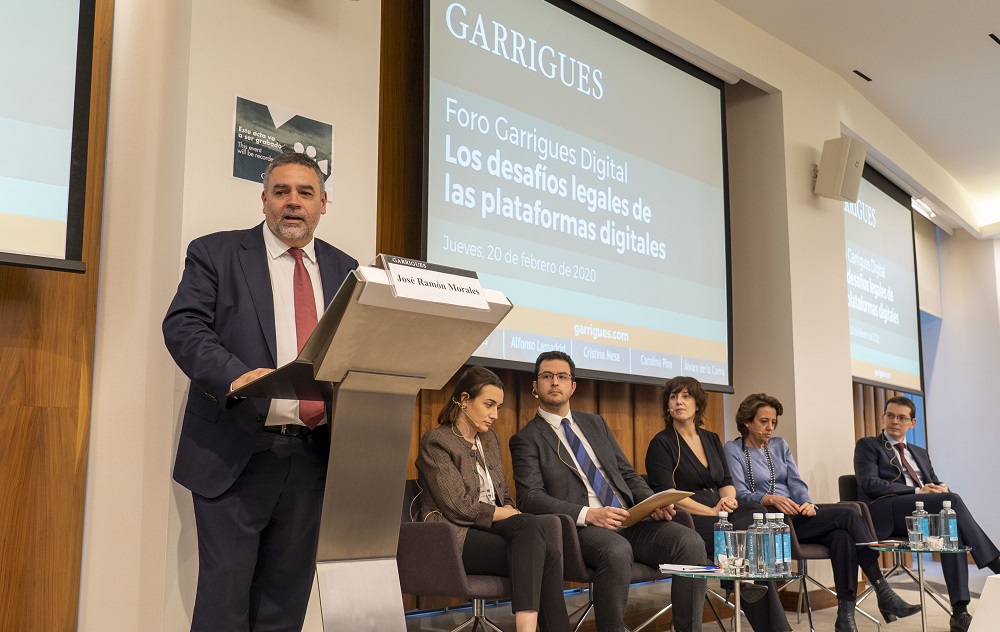
Digital platforms face a whole series of legal challenges which can be addressed from various Business Law perspectives with a vision which transcends borders. Knowing the latest developments in regulation both at international and local level is key to being able to successfully develop these disruptive business models.
The Garrigues Digital Forum, held at the firm’s headquarters in Madrid on February 20 last, was provided with the vision of experts from various areas of specialization for the purpose of offering a global vision of the problems lying in wait for digital platforms.
Platforms “are causing a disruptive phenomenon in business activity which forces existing operators to compete with new players who are adopting innovative business or service models based on information technologies and the use of large-scale data”, according to José Ramón Morales, partner of the Garrigues Corporate and Commercial Department, who opened the workshop. He explained that the current legal framework “has been built on traditional business models and it is not easy to evaluate how these new ways of doing business fit into that framework”.
When analyzing the legal context in which the digital economy, in general, operates and platforms, in particular, the vision of the European Commission, in charge of developing the EU regulatory framework, is key. Ana Balcells, representative of the Directorate General for Communications Networks, Content and Technology (DG CONNECT) at the European Commission, in her presentation, reviewed the progress and the way in which the regulation of platforms is being approached from Brussels. She referred, among other measures, to the search for alternative regulation models so as to be able to avoid the lengthy periods involved in the development of a legislative initiative. During her presentation she pointed out that the role of digital intermediaries is currently one of the major debates within the EU. She recalled that in their regulation there are certain red lines: “The basic principles of responsibility of online intermediaries are not going to be changed and the fundamental rights of EU citizens will be respected”. She was optimistic about the Digital Services Directive: “We have the opportunity to create the rules for the digital environment”.
The role of Competition Law in digital markets was analyzed by Alfonso Lamadrid, partner of the Garrigues EU and Antitrust Law Department, who addressed the important role played by the competition authorities in this area, identified the principal lessons of the EU courts and discussed the proposals for reform which are being put forward both in Europe and the U.S. Lamadrid explained that “Competition Law is agnostic in relation to business models” and that the current case law reflects a delicate balance between the different interests involved.
The responsibility of platforms for their contents is another of the key aspects. Carolina Pina, partner of the Garrigues Industrial and Intellectual Property Department, pointed out that the European Commission has provided certain criteria regarding whether platforms provide information society services or underlying services, which determines the liability regime applicable. She explained that, when determining the liability regime, one must consider issues such as the role of the platform, the actual knowledge of the unlawfulness of the content or the conduct or the steps aimed at removing the unlawful content. She concluded her presentation by pointing out that the framework of liability may be very strict, but if good business programming is done, an exclusion of liability can be achieved to allow the project to be carried out in a more relaxed legal framework.
Cristina Mesa, principal associate of the Garrigues Industrial and Intellectual Property Department, addressed the new obligations in the B2B2C environment introduced by Regulation (EU) 2019/1150 on promoting fairness and transparency for business users of online intermediation services. Among other aspects, Cristina pointed out the need to check the terms and conditions of use in B2B2C environments with a view to increasing transparency and equity towards business users and to introducing effective complaints mechanisms. Also addressed was the obligation of providers of online intermediation services and of search engines to make public without classification criteria (positioning) and the difficult balance between the transparency obligations imposed by the Regulation and the necessary protection of providers’ business secrets.
Álvaro de la Cueva, partner of the Garrigues Tax Department, closed the event with a review of the most important new tax developments affecting the digital economy at national and international level. “The taxation of the digital economy is currently the hottest topic in international taxation”, he remarked. As regards the situation in Spain, he emphasized that it has yet “to be seen how the new Tax on Certain Digital Services will be applied in practice”.